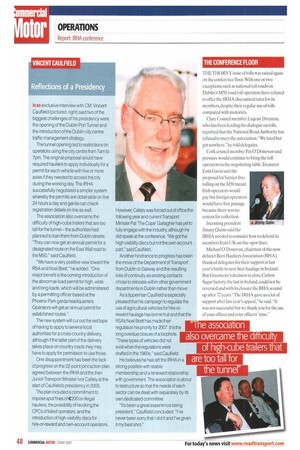VINCENT CAULFIELD
Page 48

If you've noticed an error in this article please click here to report it so we can fix it.
Reflections of a Presidency
In an exclusive interview with CM, Vincent Caulfield (pictured, right) said two of the biggest challenges of his presidency were the opening of the Dublin Port Tunnel and the introduction of the Dublin city centre traffic management strategy.
The tunnel opening led to restrictions on operators using the city centre from 7am to 7pm. The original proposal would have required hauliers to apply individually for a permit for each vehicle with five or more axles if they needed to access the city during the working day. The IRHA successfully negotiated a simpler system whereby the permits are obtainable on line 24 hours a day and garde can check registration details on line as well.
The association also overcame the difficulty of high-cube trailers that are too tall for the tunnel —the authorities had planned to ban them from Dublin streets. They can now get an annual permit for a designated route on the East Wall road to the M50," said Caulfield.
We have a very positive view toward the RSA and Noel Brett," he added. "One major benefit is the coming introduction of the abnormal-load permit for high, wide and long loads, which will be administered by a permitting officer based at the Phoenix Park garde headquarters. Operators will get an annual permit for established routes."
The new system will cut out the red tape of having to apply to several local authorities for a cross-country delivery. although if the latter part of the delivery takes place on country roads they may have to apply for permission to use those.
One disappointment has been the lack of progress on the 22-point joint action plan agreed between the IRHA and the then Junior Transport Minister Ivor Callely at the start of Caulfield's presidency in 2005.
The plan included a commitment to impose spot fines of €200 on illegal hauliers; the possibility of revoking the CFCs of failed operators; and the introduction of high-visibifity discs for hire-or-reward and own-account operators. However, Callely was forced out of office the following year and current Transport Minister Pat The Cope' Gallagher has yet to fully engage with the industry, although he did speak at the conference. We got the high visibility discs but not the own-account part," said Caulfield.
Another hindrance to progress has been the move of the Department of Transport from Dublin to Galway and the resulting loss of continuity as existing contacts chose to relocate within other government departments in Dublin rather than move.
As a tipperman Caulfield is especially pleased that his campaign to regulate the use of agricultural vehicles for hire-orreward haulage has borne fruit and that the RSA's Noel Brett has made their regulation his priority for 2007. It is the long overdue closure of a loophole. "These types of vehicles did not exist when the regulations were drafted in the 1960s," said Caulfield.
He believes he has left the IRHA in a strong position with stable membership and a renewed relationship with government. The association is about to restructure so that the needs of each sector can be dealt with separately by its own dedicated committee.
"It's been a great experience being president," Caulfield concluded. "I've never been sorry that I did it and I've given it my best shot."


























































































































































































